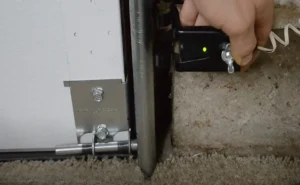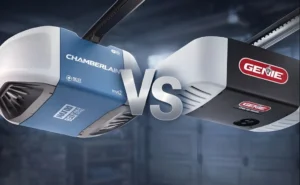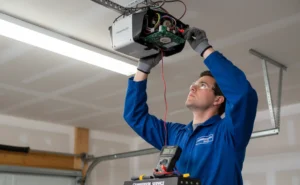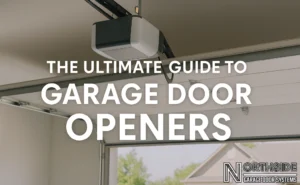Choosing between a belt and chain garage door opener is one of the most common decisions homeowners face when buying or upgrading an opener. Both work well but differ in noise, cost, durability, and maintenance. The right choice depends on what matters most to you—quiet operation, long-term value, or strength.
Garage door openers are no longer a luxury; they’re essential for convenience and home security. Picking the wrong type can mean extra noise or constant maintenance, while the right one will run smoothly for years.
In this guide, we’ll break down how belt and chain openers compare in performance, price, and ideal use cases, plus their pros, cons, and maintenance needs—so you can choose confidently.
- Where you live
- How you use your garage?
- What space you have
- What noise (or silence) you can live with?
We are not going to jump into detailed comparisons yet. The first thing you’ll need to fully grasp is how belt and chain garage door openers work.. Despite serving the same purpose (lifting and lowering your garage door), their mechanics are different. Their mechanical differences are what impact their performance, sound, sturdiness, and upkeep needs.
Being aware of how these two mechanisms—belt drive garage door opener and chain drive—work gives you the foundation you need before heading into the technical comparisons.
Knowing the basics allows you match the right system to your lifestyle and garage setup when comparing a belt vs chain garage door opener.
Belt Drive Garage Door Opener
A belt drive garage door opener works using an elastic rubber belt reinforced with fiberglass, polyurethane, or steel to pull the trolley mechanism. This system is designed to provide a smoother and much more soundless process compared to chain mechanisms. Its design mimics the fan belt in a vehicle, offering efficient and noiseless movement.

Belt Drive Garage Door Opener Pros: |
Belt Drive Garage Door Opener Cons: |
| Exceptionally silent, perfect for homes with bedrooms or living spaces above or head-to-head to the garage. | It requires a higher initial investment due to its advanced components and features. |
| Makes less vibration, which protects the opener mechanism and prolongs its lifecycle. | Might not work so well with oversized or exceptionally heavy garage doors in severe climates. |
| Typically fits in with smart technology for greater control and monitoring from your smartphone. This seamless integration is highly valued by users. |
Chain Drive Garage Door Opener
A chain drive garage door opener uses a strong metal chain to move the door along a track. This system is repeatedly compared to a bicycle chain for its function and durability. It has been in the market longer than belt systems and is commonly regarded as the more “industrial” option.
Chain Drive Garage Door Opener Pros |
Chain Drive Garage Door Opener Cons |
|
Known for its strength and robustness, especially with heavier doors made of solid wood or steel. |
Produces a noticeable level of noise and vibration. |
|
It’s cheaper than belt systems, which makes it an ideal for ideal fit for homeowners under budget constraints. |
Entails regular upkeep tasks, such as lubrication and, in most cases, tension adjustments. |
|
Repairs and spare part replacements are usually simpler and cheaper. |
Belt vs Chain Garage Door Openers: Key Performance Differences
If you are evaluating belt drive vs chain drive garage door openers, you need to weigh their real-world performance in aspects such as noise, velocity, durability, and preservation tasks. These factors directly affect your daily convenience and long-term satisfaction.
Regarding daily usage, these belt drive vs chain drive garage door opener differences will have an effect on your satisfaction (or dissatisfaction). A quieter garage door opener might compensate for the higher purchase price. This is mostly important if you and your family use the garage several times a day. On the other hand, if your priorities are strength and dependability under tough conditions, the extra noise that the chain opener produces won’t be an issue.
Noise Level
For most families, noise tends to be the decisive factor, particularly in multi-level homes or those with bedrooms near the garage.
- Belt Drive: Offers whisper-quiet operation, which makes it the undisputed winner for attached garages or noise-sensitive setups.
- Chain Drive: Known for its louder, mechanical sound, which will most likely become more noticeable over time if it is not appropriately maintained.
Speed
The speed at which your garage door opens and closes affects daily flow, particularly during action-packed mornings, in emergencies, or for late sleepers who wake up with just a few minutes to get to work.
- Belt Drive: Usually faster and smoother. This is due its to diminished friction and modern motor technology.
- Chain Drive: It’s slower than belt drive and can function with slight jerks or delays. This happens much more frequently in older systems or in those that don’t undergo proper maintenance.
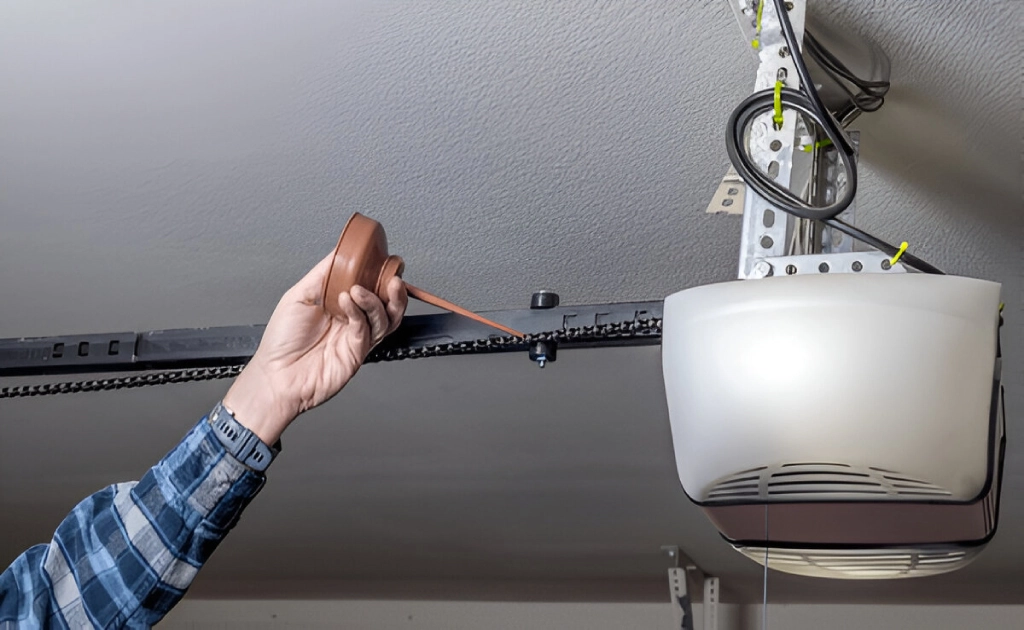
Durability
How long the opener will last is one of the factors most people value when comparing a belt vs chain garage door opener. This feature, however, depends on two things: the strength of the material they are made of and how well each system handles wear and tear.
- Belt Drive: Highly durable under regular, average use. Yet, it may degrade faster when used for lifting extra-heavy doors or in extreme weather conditions.
- Chain Drive: Designed to be used for long-term in tough conditions; it’s frequently used in commercial or industrial or domestic environments where there’s a lot of traffic.
Maintenance
Keeping your opener in good condition will demand time and money, which will affect the total cost in the long run.
- Belt Drive: The belt opener requires very little upkeep. You’ll mostly have to carry out occasional visual inspections.
- Chain Drive: Needs more recurrent checkups and maintenance tasks. For example, lubrication and chain tightening every 6 months.
Comparison Table: Belt Drive vs Chain Drive Garage Door Openers (Features, Pros & Cons)
| Feature | Belt Drive Opener | Chain Drive Opener |
|---|---|---|
| Noise | ✅ Amazingly quiet (comparable to fridge hum) | ❌ Noisy, vibrations may disturb household |
| Durability of Parts | ✅ Reduced vibration preserves door & opener | ❌ Vibration may loosen hardware over time |
| Best For | ✅ Attached garages, bedrooms above garage | ✅ Heavy-duty doors, high-traffic or commercial use |
| Technology & Features | ✅ Often paired with modern features (LEDs, Wi-Fi, diagnostics) | ⚖️ More basic, but reliable |
| Maintenance | ✅ Minimal service, no lubrication needed | ❌ Needs regular lubrication & checkups |
| Replacement Parts | ❌ Proprietary, sometimes expensive | ✅ Widely available, interchangeable |
| Performance in Harsh Weather | ❌ Rubber may wear faster in moist/cold climates | ✅ Handles harsh climates better |
| Overall Drawback | Higher upfront & repair cost | Noisy operation, higher long-term maintenance |
Cost and Maintenance of Belt and Chain Drive Openers
When assessing the total cost of garage door opener systems throughout their lifespan, you’d better look beyond just the listing’s price. On average, a belt drive opener lasts around 10 years with minimal maintenance, but factors like usage and climate can affect longevity.
If you’re wondering how long do garage door openers last, the answer depends largely on the type of drive system you choose. Think about how often you’ll have to call a technician for repairs, replace parts, or spend your own time on upkeep. A belt drive may be more expensive at the moment of purchase, but its low-maintenance nature could result in fewer expenses in the long term.
Being aware of what the cost of a garage door opener comprises is decisive if you are planning your upgrade or a new installation. You need to consider the purchase prices and the long-term upkeep costs to decide.
This is a financial decision for many; depending on the use they’ll give to the garage door, a lower investment at the moment of buying it may mean high long-term costs.
Upfront Cost
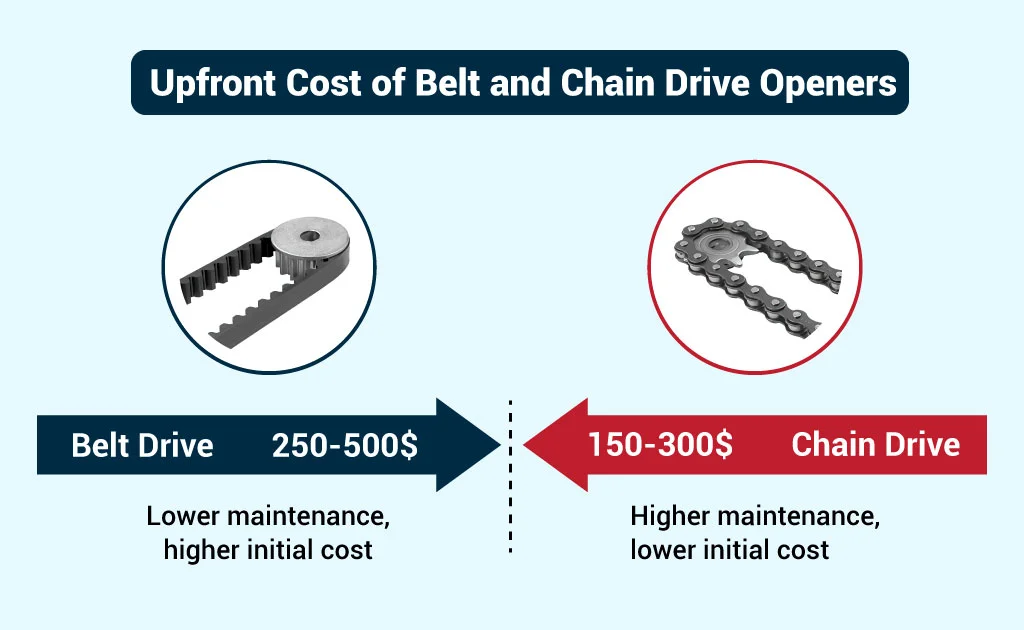
- Belt Drive: It usually costs between $250 to $500, depending on brand, horsepower. Built-in features such as battery backup or Wi-Fi connectivity also have a big impact on the price.
- Chain Drive: Its cost varies from $150 to $300, which makes it a more tempting option for buyers under a budget or landlords who manage multiple properties and prioritize cost savings.
Long-Term Maintenance
- Belt Drive: It is meant to last up to 10 years, requiring minimal service. Doesn’t need lubrication and has No lubrication is needed, and as it has fewer moving parts, it undergoes less wear.
- Chain Drive: Although it’s sturdy, you might need to make more calls to the technical service (or do yourself extra maintenance tasks) to lubricate the chain, tighten pieces, or change parts. Over time, these increase the costs, mainly in zones with harsh weather, as they accelerate corrosion; another important factor to consider in the belt vs chain garage door opener debate.
Belt Drive Vs. Chain Drive Garage Door Opener Cost & Maintenance Comparison
| Aspect | Belt Drive Garage Door Opener | Chain Drive Garage Door Opener |
| Upfront Cost | $250 – $500 (depends on brand, horsepower, features like Wi-Fi/battery backup) | $150 – $300 (budget-friendly, good for landlords with multiple properties) |
| Lifespan | ~10 years with minimal service | Durable but may require more frequent upkeep |
| Maintenance Needs | Very low — fewer moving parts, no lubrication required | Higher — chain lubrication, tightening, corrosion prevention |
| Long-Term Cost | Lower, due to minimal servicing | Higher, due to regular maintenance & part replacements |
Although belt drives may, initially, seem more expensive, they require less maintenance and have longer durability, which means added value over time for certain users.
Ideal Use Cases for Each Drive Type
Matching the opener category to your specific use case is key. Take a look at these examples, they may help you determine which type is better for your home or project.
Choose Belt Drive If:
- You have a bedroom or workspace above or near the garage and need a quiet opener.
- You want a modern, sleek system that integrates easily with smart home platforms (like Alexa or Google Assistant).
- Your garage door is regular, of average size and weight (not reinforced or wooden).
- You don’t mind investing more upfront for long-term convenience.
Choose Chain Drive If:
- You use your garage mainly for storing stuff or as a workshop.
- Your garage door is heavy or custom-built and requires more lifting power.
- You are located in a rural (or other) setting where noise is not a concern.
- You’re looking for a cost-effective and solid solution.
In the end, deciding between a belt vs chain garage door opener comes down to how you use your garage and what trade-offs you’re comfortable with. If you value quiet mornings and tech-friendly features, the belt drive would be a winning bet. But if you prioritize strength, durability, and money savings, particularly for heavier doors, the chain drive offers an unbeatable value.
Many homeowners choose LiftMaster for its reliability and advanced features. If you’re installing one, you may also want to know how to program a LiftMaster garage door opener to take full advantage of its smart technology.
Buyer’s Guide: Which One Should You Choose?
We created this brief but comprehensive garage door opener buying guide to help you align your needs with the system that suits you better when comparing a belt vs chain garage door opener:
1st Step: Garage Location
- If your garage shares a wall with a bedroom, living space, or workplace, a belt drive is the way to go to ensure a quiet, undisturbed living.
- For detached garages, the (cheaper) chain system can be a good solution.
2nd Step: Budget
- If you don’t have a limited budget, you can enjoy the advantages of a belt drive’s advanced features and quieter operation.
- Buyers under budget limitations can still secure durability and strength with chain openers.
3rd Step: Garage Door Material
- For lightweight doors (aluminum, fiberglass): Choose belt openers.
- For heavy doors (wood, insulated steel): Choose chain openers.
4th Step: Technology Preferences
- If you are interested in having remote access and home automation, belt systems provide better integrations. Modern belt drive systems often include Wi-Fi connectivity and smartphone access, which makes it easier to program a garage door opener for customized schedules and remote use.
5th Step: Noise Tolerance
- If you’re sensitive to sound, have pets that get easily startled by machine-driven sounds, or simply if silence matters to you, belt systems will be your best choice.
As you study these factors, don’t forget that there’s no one-size-fits-all solution. We created this garage door opener buying guide to help you consider and conclude which features really matter in your daily life. Think realistically about how you’ll use your garage door, how much noise or silence matters to you and those around, and how much tech integration you want—it’ll make your decision-making process much easier.
Expert Tips and Recommendations
For additional information, we recommend that you review some of the most helpful garage door opener repair tips and practices to extend the life of your system:
- Visual Examinations: Look for wear on belts or chains every 3 to 6 months.
- Noise Reduction: Utilize rubber vibration dampers or wall brackets to diminish functioning noise.
- Keep Your Tracks Clean: Dirt and debris interfere with smooth movement, especially for chain drives.
- Backup Power: Don’t overlook purchasing a unit with a battery backup to guarantee continuous access, even during blackouts. You can read our battery replacement article guide to learn how to change the battery yourself.
- Update Older Units: If your system is older than a decade, making a replacement instead of a repair can be a better long-term solution. New models come with better safety and general features.
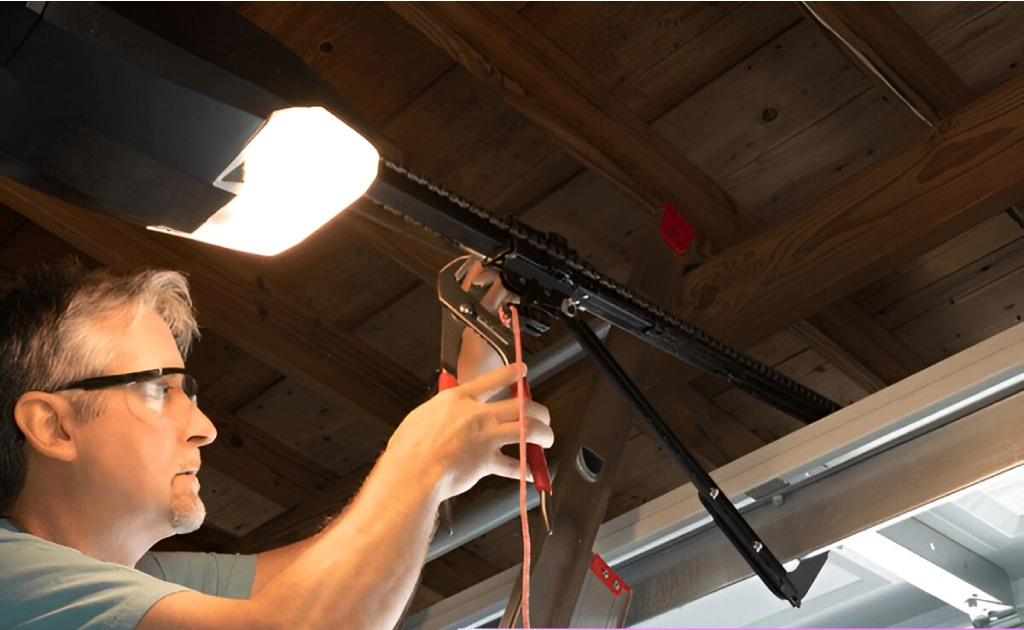
If you follow these simple garage door opener repair tips, you will notice the benefits in the long run. Spending a few minutes on preventative care every few months can help you avoid later costly fixes and can also extend the lifecycle of your system. It’s like car maintenance—preventing issues through proper care allows everything to keep running flawlessly (and saves you from stress and unexpected costs later on).
Frequently Asked Questions
Is a belt drive garage door opener better than a chain drive?
It depends on your needs. A belt drive opener is much quieter, smoother, and requires less maintenance, making it ideal for attached garages or homes with bedrooms nearby. A chain drive opener is noisier but stronger and often cheaper, making it better for heavy garage doors or detached garages.
Can you replace a chain drive with a belt drive?
Yes, in most cases you can replace a chain drive with a belt drive opener. Many garage door systems are compatible with both, but the process may require new hardware or professional installation to ensure smooth operation. Always check your door’s weight and compatibility before switching.
What are the disadvantages of a belt drive garage door opener?
The main drawbacks of belt drive openers are:
- Higher upfront cost compared to chain drives.
- Not always suitable for very heavy or oversized garage doors.
- Rubber belts may wear faster in extreme heat, cold, or humidity.
Which garage door opener lasts longer: chain or belt?
Both types are durable, but chain drive openers often last slightly longer because metal chains can withstand heavy use and harsh conditions. However, belt drives can still last around 10 years or more with minimal maintenance, and their quieter operation makes them a better long-term choice for many households.
Conclusion
Choosing between a belt vs chain garage door opener implies much more than cost—it’s a matter of daily lifestyle, garage design, and long-term tranquility.
Choose a belt drive if you want silent operation, smart features, and minimal maintenance. Bet on a chain drive if you need raw strength, durability, and a budget-friendly solution for a detached or occasionally used garage.
Still unsure? Seeking the assistance of a certified technician can help you define the best fit for your door type and household setup. Making the right choice grants seamless operation, fewer headaches, and years of dependable performance.
No matter which option you go with, the point is to choose a system that fits your particular needs and space. With a better understanding of the belt vs chain garage door opener debate, you can make a smart, informed choice that brings you convenience, peace of mind, and reliable performance every time you open the garage.


